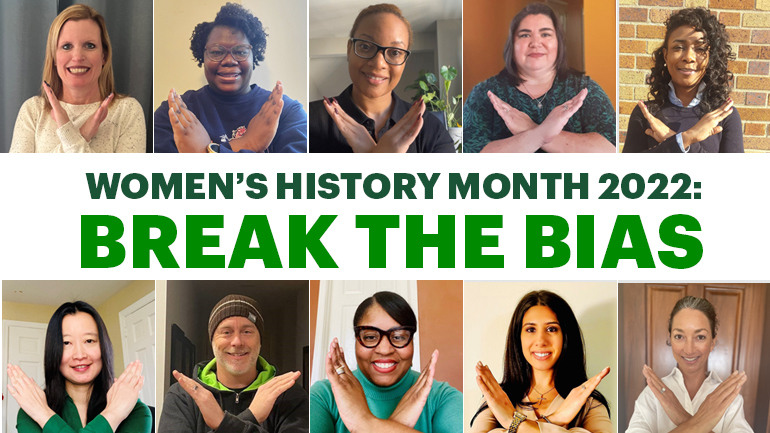This article was originally published on LinkedIn.
This year's International Women's Day theme is "Break the Bias." I believe as a woman in banking, it is important for us to explore the many biases that persist within the industry, but it is equally important to acknowledge and overcome biases within ourselves.
Early in my career, I was offered a position on the sales and trading desk. Coming from a Credit background, this role was outside my comfort zone, and I had my own preconceived biases of what someone in this role had to be like to be successful. I envisioned an outgoing man who had dinners and golf outings with "the guys." I allowed this to impact my perception of my own capabilities and almost talked myself out of taking the job. However, once in the role, I was able to create my own version of success. I developed profitable relationships in different ways and found that I could recreate the role in a way that worked for me. I broke down a bias I held about myself and gained great experience.
As a woman leader in a male-dominated industry, I have worked to break down biases and encourage others to question why these biases exist and how we can challenge them. According to the McKinsey study, Closing the Gap: Leadership perspectives on promoting women in financial services, although women in North America account for more than half of the entry-level workforce in financial services, they still represent fewer than one in five in the financial services C-suite. This is certainly a disappointing statistic. What could account for this?
An interesting finding, according to an internal Hewlett Packard study, is that men apply for a job when they meet only 60% of the qualifications, while women apply only if they meet close to 100% of them. This speaks to how women can be their own worst enemy and believe they must prove themselves and often be twice as good. This perception could not be further from the truth and women need to break down the biases they hold against themselves and how they believe others view them to advance in the workforce and elevate those around them. Take the risk, especially if you have managers or advisors encouraging you.
The pandemic has also provided an opportunity for leaders to re-evaluate what successful leadership looks like and how their own biases may impact their ability to support colleagues. There is a common stereotype that women are more emotional and unable to take on the heavy lifting of corporate leadership and that an empathetic leadership style is a weakness. However, if anything, the pandemic has shown us the strength and importance of a leadership style predicated on empathy, especially in an environment where many colleagues are working remote and facing personal challenges. Since the start of the pandemic, I have had the opportunity to combine my logical and analytical side with a more empathetic approach to ensure I listened more, checked in on colleagues regularly to let them know they were appreciated and encouraged open dialogue. As a result, I have had the opportunity to virtually meet talent from across our organization and learn more about their career aspirations.
With that, I would like to offer a few pieces of advice that have helped me throughout my career, and I hope will help others:
Break Your Own Bias and Get Out of Your Comfort Zone: If you are interested in a role, before you disqualify yourself from applying, think about why and if those proposed disqualifications are valid or are skills you can learn on the job. If you can do 100% of the job, you shouldn't do that job. Create opportunities for yourself to learn and grow. People typically gravitate to their comfort zone. However, the workforce and the way we do business is constantly changing, especially in light of the pandemic. Know the strengths and skills you bring to the table and trust that you can recreate any role to make it your own and be successful.
Pursue Mentorship and Allyship: Find mentors and allies within your organization and in the industry, who can advocate for you and bring your name to the table. Having mentors and allies in your corner will allow you to learn about new opportunities and networks that can help you advance and grow as a person and a leader.
As a Leader, Encourage Open Dialogue: Given we have fewer opportunities for in-person interactions, emotionally intelligent and empathetic leadership has proven itself to be most effective in a disaggregated and disconnected workforce. However, as leaders, it has also demonstrated how important it is for us to listen, pay close attention to our teams and check our own preconceived notions at the door.

